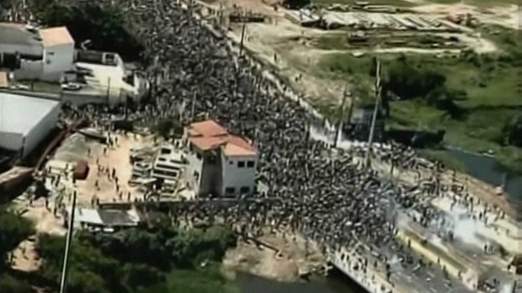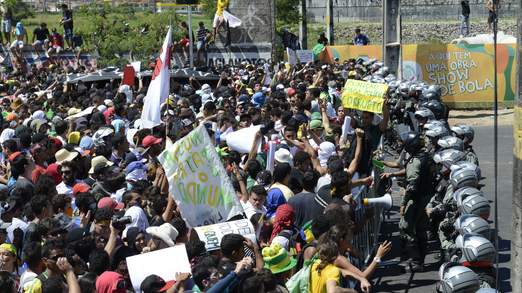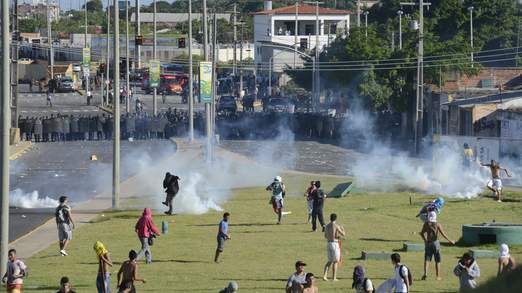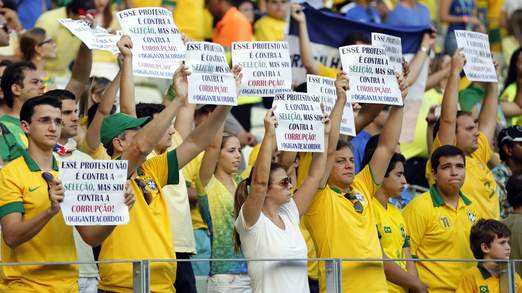Hundreds Of Thousands Rise Against Rich-Poor Gap And Corruption In Brazil
By Countercurrents.org
20 June 20, 2013
Countercurrents.org

Protesters march towards the Castelao stadium in Fortaleza

National forces block the march
Brazilian authorities have failed to halt nationwide protests despite reversing the public-transport fare increases that sparked the unrest.
Crowds blocked main roads in Sao Paulo and Brasilia , and protesters confronted police in Rio de Janeiro state shortly after the U-turn was announced.
Earlier, there were clashes before Brazil 's football team played Mexico in the Confederations Cup in Fortaleza . At least two people were injured near a stadium in the city -- one of several sites hosting matches in the Confederations Cup and where elite police units have fanned out to protect the sites.
Some of the at least 30,000 protesters hurled stones at security forces on June 19, 2013.
Police fired tear gas and rubber bullets to disperse protesters. Clashes erupted when a protest march was stopped by police.
During the protest some demonstrators carried banners reading: "A teacher is worth more than Neymar", in a reference to Brazil 's star footballer who played and scored against Mexico .
Before the match, Neymar spoke in favor of the protesters, saying in a message on Facebook: "I'm Brazilian and I love my country. I have a family and friends who live in Brazil . For that reason, I want a Brazil which is more just, safer, healthier and more honest.
"Forward, forward," the demonstrators shouted as a cordon of police blocked access to the $240 million Castelao stadium. An indignant woman declared "this is a dictatorship" as police fired rubber bullets.
Protesters are angry at corruption and high spending on next year's World Cup.
Activists say they have not changed their intention to hold the biggest demonstrations.
Sao Paulo mayor Fernando Haddad said the fare hike decision reversal would be a "big sacrifice" and said other investments would have to be cut.
Rio mayor Eduardo Paes made a similar point, saying the lower transport prices would cost the city 500m reals ($225m) a year. Paes conceded that local transport was of poor quality and expressed readiness to review the bus fares.
The mayors of Cuiaba , Recife , Joao Pessoa and other cities have already announced a reduction in bus fares in response to the protests.
But the protesters were unmoved by the gesture.
"It's not really about the price [of transport] any more," said Camila Sena, 18, at a protest in Rio de Janeiro 's sister city of Niteroi . "People are so disgusted with the system, so fed up that now we're demanding change."
One demonstration in the city of Belo Horizonte continued for more than 10 hours.
The controversy over bus and metro fares was only the issue that got the marchers on to the streets - it all seems much bigger than that now.
The objectives of this diverse protest movement are very broad, such as demanding better education and health services. A sluggish economy and inflation that is affecting the lives of ordinary Brazilians every day can be added to the mix. Protests marches are fueled by anger that -- in a country with a wide rich-poor divide -- billions of dollars were being spent on stadiums and far too little was earmarked for social programs.
Hundreds of thousands of people have taken to the streets across this continent-sized country to denounce the $15 billion being spent on this month's Confederations Cup and the 2014 World Cup.
"While you watch television, I am changing the country. Football no, we want education," read one placard hoisted by a demonstrator in Fortaleza .
Politicians with high salaries giving jobs and flights to relatives are widely scorned. Inequality and the huge cost of hosting the World Cup and the Olympics are key issues raised by demonstrators alongside corruption, crime and police brutality.
The current unrest is the biggest since 1992, when people took to the streets to demand the impeachment of then-President Fernando Collor de Mello.
President Dilma Rousseff has said she was proud that so many people were fighting for a better country.
The dilemma for the political leadership is how to answer so many different concerns among a vast group of people with momentum and social media on their side.
The protesters also railed against the country's entire political class, which is widely seen as corrupt.
"We are protesting the use of public funds for the construction of stadiums, money that should be used for education," said Matheus Dantas, 18.
Faced with the widening protests, federal and state authorities made conciliatory gestures, with Rousseff vowing to listen to the voices of the angry youth and calling their demands legitimate.
"It is the beginning of the tropical spring," leftist politician Givalnildo Manoel told AFP in Sao Paulo .
The protests have been organized by a disparate group of activists who have rallied supporters via social media.
To help maintain order, Rousseff dispatched federal troops to five cities hosting games during the Confederations Cup that began earlier this month.
The deployment is similar to the previous use of federal troops when crime, violence or other unrest disrupted annual Carnival celebrations and other big events.
Contrasting the country's high taxes with its ramshackle schools, hospitals and other shabby government services, demonstrators have criticized the 28 billion reais ($12.9 billion) of public money being spent on the World Cup, to be played in 12 Brazilian cities.
Protesters marched toward the stadium and carried banners asking residents to "hit the street" and demanding "health, education, not corruption."
In Sao Paulo , demonstrations have so disrupted the already gridlocked city that many companies have allowed employees to leave early in recent days or allowed them to work from home.
Police arrested more than 63 people after protesters torched a police facility, tried to storm City Hall and broke windows and ransacked stores.
"It's difficult to get ahead of the movement because there isn't a clear image of who they are or what exactly they will do," said David Fleischer, a political scientist at the University of Brasilia . "It's hard to have a discourse with someone you don't know."
In central Sao Paulo , one graffiti scrawled on the front of the city hall reads: "The people have awoken".
The national force was sent to five out of six states including Rio de Janeiro , Bahia, Minas Gerais and Brasilia while an additional 6,000 state police troopers were deployed to Fortaleza .

Demonstrators run as police attempt to disperse the crowds with tear gas

Protests during the Brazil and Mexico Confederations
Cup tie
Source: From Sao Paulo/Fortaleza, Brazil , AFP, Reuters, Sky News, BBC
Comments are moderated


